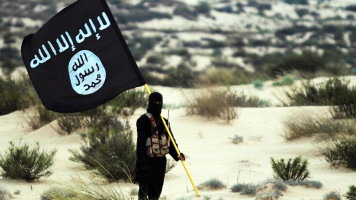Saudi Arabia, Iran, Egypt leading executioners in 2022 'record year': Amnesty
The Middle East and North Africa (MENA) region came in the lead of countries with the most executions in 2022, which reached a record high in five years, Amnesty International has said in a report.
Recorded figures of people executed rose from 520 in 2021 to 825 last year in the MENA countries, mainly in the region’s most notorious executioners such as Saudi Arabia, Iran and Egypt.
"Countries in the Middle East and North Africa region violated international law as they ramped up executions in 2022, revealing a callous disregard for human life," Amnesty International’s Secretary General Agnes Callamard said.
"The number of individuals deprived of their lives rose dramatically across the region."
He said Saudi Arabia executed 81 people in a single day – which occurred in March 2022 - while Iran, "in a desperate attempt to end the popular uprising…executed people simply for exercising their right to protest."
Iran was rocked by protests since September 2022 over the killing in custody of a 22-year-old Kurdish Iranian woman.
The long and brutal history of enforced disappearances in Iraq 👇
— The New Arab (@The_NewArab) April 15, 2023
✍ @pauliddon https://t.co/fmrtlLhwYV
The report said a staggering 90% of the whole world’s known executions outside China happened in just three MENA countries. Alongside regional powerhouses Saudi Arabia and Iran, Egypt was one of those.
"Recorded executions in Iran soared from 314 in 2021 to 576 in 2022; figures tripled in Saudi Arabia, from 65 in 2021 to 196 in 2022 — the highest recorded by Amnesty in 30 years — while Egypt executed 24 individuals," the report said.
China remained the world’s biggest executioner, coming ahead of the three MENA countries and the United States. While no accurate numbers exist, Amnesty believes thousands received the death penalty in China last year.
Amnesty said Kuwait and the Palestinian Authority resumed executions last year.
Those killed over drug-related offences more than doubled last year compared to the previous year around the world. In Saudi Arabia, 57 were executed over the crime, while 255 were executed in Iran.
"Drug-related executions are in violation of international human rights law which states that executions should only be carried out for the 'most serious crimes' - crimes that involve intentional killing."
"In a cruel twist, close to 40% of all known executions were for drug-related offences. Importantly, it’s often those from disadvantaged backgrounds that are disproportionately affected by this callous punishment," said Callamard.
"It’s time for governments and the UN to up the pressure on those responsible for these blatant human rights violations and ensure international safeguards are put in place," he added.
Earlier this year, activist groups claimed executions in Saudi Arabia have nearly doubled under King Salman and his son, de facto ruler Mohammed bin Salman, detailing cases of torture and other human rights violations.
Capital punishment has soared from an average of 70.8 executions a year from 2010 to 2014, to 129.5 a year since King Salman took power in 2015, according to a report by Reprieve and the European Saudi Organisation for Human Rights.
Since late April, the pace of executions in Iran has dramatically increased, and between 25 April and 13 May the government sent at least 75 prisoners to the gallows, putting the average number of death penalties carried out in this period at an alarming number of one execution at about every six hours.
A 2022 report about the number of executions in Iran showed that the Baluch minorities made up 30% of all executions last year, while the group represents only about six percent of the country's population.
More people await death row in both Iran and Saudi Arabia, which in March signed a historic China-brokered deal to end years of hostilities.







 Follow the Middle East's top stories in English at The New Arab on Google News
Follow the Middle East's top stories in English at The New Arab on Google News

![Beirut stadium [Getty]](/sites/default/files/styles/image_330x185/public/1235817272.jpeg?h=a5f2f23a&itok=0UZr2fIL)
![Israeli forces destroyed a religious shrine in the village of Shama in southern Lebanon [Getty]](/sites/default/files/styles/image_330x185/public/2184560625.jpeg?h=a5f2f23a&itok=Ge_H4GfP)